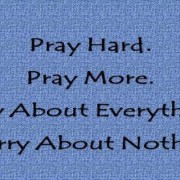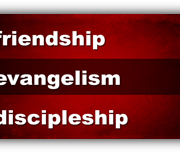Cemetery or Seminary?
In my spiritual journey God has used a number of things to shape me. I think I accepted Christ at a Tuesday night Bible study that was at a Vineyard church. From there I started attending Horizon, then to The Rock when Miles McPherson launched it, then to a little Mexican church in National City, then to help with an Evangelical Free Church, then I planted a church with my father-in-law that became Southern Baptist, to my current church which is Southern Baptist…this flyover covers about 17 years of my church life. During the early years, 1996-2001, I traveled extensively as a Navy SEAL and would often find myself in different places on Sundays…I would always land at a Calvary Chapel because they were fairly consistent with their franchised product. I know you guys are not a denomination, but nobody on the outside buys your claims. 🙂
As I was growing in the Lord and starting to sense God’s call, I wasn’t sure what the next step was or how I was to pursue this vague feeling inside. I remember many of the pastors in Calvary Chapel bashing, or subtly making jabs against seminaries by referring to them as cemeteries. I sort of found this funny because from the outside looking in it appeared as though many of the pastors didn’t have college degrees let alone any time at seminary. Where was this attack coming from? Why would they be critical of something they never actually participated in or completed? Maybe it was a chip on their shoulder? Maybe. Maybe there was some truth in what they said? Possibly. I know that I may be treading on dangerous ground as the majority of the writers of this blog are Calvary Chapel guys. I am the outsider, the black sheep of the group proudly waving my Southern Baptist colors…which feels weird as I don’t really feel connected deeply to this group, but I digress.
As God led me away from Calvary Chapel circles, I was exposed to a variety of very godly pastors who all had graduated from seminary. Different seminaries all conservative, but with different flavors. It was during this time that God’s call became very strong and my desire to study the Bible at a deeper level continued to grow, but I didn’t know how I could satisfy this as I was preparing to deploy to the Middle East. Thankfully, I was informed of Moody Bible Institute’s distance learning program. I immediately enrolled in a number of courses like “Old Testament Survey”, “New Testament Survey”, “Elements of Bible Study”, and “Advanced Bible Study Methods.” Oh, my soul was getting nourished in ways that I couldn’t have imagined. I ended up completing a year’s worth of coursework through Moody’s program. This whole experience opened up the door for me to complete my Bachelor’s in Biblical Studies and Master’s of Divinity degree through Southern California Seminary. From there, I would go on and work on my Doctor of Ministry degree through Midwestern Baptist Theological Seminary, but I withdrew from the program when I was “All but dissertation” because I felt like it was interfering with the present ministry I was called to.
I had a wonderful experience through Bible College and Seminary. I would not be able to handle the Word of God as accurately as I do now without my training there. I understand that not every seminary is created the same, but that doesn’t mean that all are bad and ineffective in training people. Here are a few reasons why I support and encourage men called to the ministry to go to seminary:
You will grow and mature through the process. Seminary is challenging. Juggling life with coursework is challenging in of itself, but a good seminary is going to forged you to be handle the ministry–whether you are preparing to enter or are already doing the work. To hunker down and to do the work will shape you in your walk with God. This difficult season in my life definitely prepared me for the rigors that pastoral ministry would bring.
You will be equipped in handling the Word of God. I often am asked, “Did seminary really help you?” I laugh and respond with something like, “If I wasn’t in seminary, I would not have been digging, researching, and writing about topics that forced me deep within the Word on a daily basis.” Seminary will sharpen and expand you knowledge and application of the Word of God. There is no way around this, you cannot experience this demand on your own. I have often heard, “Seminary is like trying to take a sip of water from a fire hydrant.” This is so true!
You will be exposed to others schools of thought. I can already hear some Calvary guys jumping on this point saying, “Ahh, you will be brainwashed and wander into bad doctrine! Beware!” An assumption of mine is that we are talking about a conservative, Bible believing and proclaiming seminary–which there are many. Within this context you will rub shoulders and discuss biblical things from different vantage points. This is iron sharpening iron in its truest sense. For example, when I wrote my thesis on “The Christian and Combat” we brought in a pacifist, who deeply loves the Lord, to challenge my position. I am better because of this experience of being exposed to other views within Bible believing Christianity.
You will develop deep friendships and broaden your network. Outside of the coursework, I developed deep friendships with others in the ministry from a variety of denominations or non-denominations respectfully. These friendships have been very meaningful and helpful to me in my service in the ministry at large. I am thankful for these men that I can go to for support and outside consultation by men who are outside of my circle.
Concluding thoughts. First, if you are debating going to seminary choose well. The price is the least important factor. Seek out graduates and examine the doctrinal position of the school. If you don’t feel comfortable with this, ask someone who can guide you and give you wisdom for not all seminaries are created equal. Second, if you haven’t been, or graduated from seminary, I would ask you to refrain from the bashing of them through subtle comments like letting “cemetery” slip out of your mouth when “seminary” was the intended word. It makes one look like they have a chip on their shoulder for lacking something. Of course one doesn’t need seminary to go to the ministry…we simply need to meet the requirements of 1 Timothy 3:1-7. Finally, whatever your background, I encourage you to read, grow, and study intently as you lead the body of Christ.










